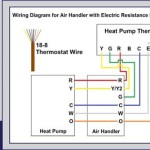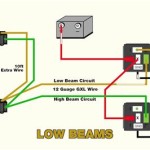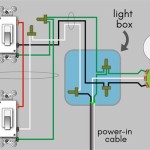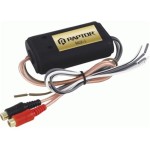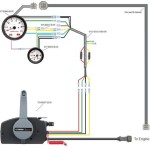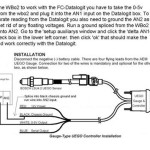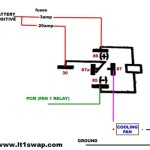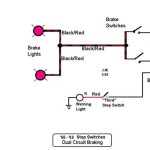Trailer plug wiring is a system of electrical connections that allows a trailer to be connected to a towing vehicle. It provides power and communication between the two vehicles, enabling the trailer’s lights, brakes, and other functions to operate. An example is the 7-pin connector, commonly used in North America for towing trailers with electric brakes, taillights, turn signals, and running lights.
Trailer plug wiring is essential for safe and legal towing. It ensures that the trailer’s lights and brakes are functioning correctly, reducing the risk of accidents. It also provides convenience, allowing the trailer’s electrical systems to be controlled from the towing vehicle.
A key historical development in trailer plug wiring was the introduction of standardized connectors. This has simplified the process of connecting and disconnecting trailers, and has improved the reliability and safety of the electrical connections.
This article will provide a comprehensive overview of trailer plug wiring, including the different types of connectors, their functions, and proper wiring techniques. Whether you are a novice or an experienced tow driver, this guide will provide you with the information you need to ensure the safe and reliable operation of your trailer.
Trailer plug wiring is a crucial aspect of towing, ensuring the safe and reliable operation of trailers. It involves understanding the different types of connectors, their functions, and proper wiring techniques.
- Types: 4-pin, 5-pin, 6-pin, 7-pin
- Functions: Power, ground, taillights, brake lights, turn signals
- Wiring: Color-coded wires, proper connections
- Safety: Ensures proper lighting and braking
- Convenience: Allows control of trailer functions from towing vehicle
- Standardization: Ensures compatibility between vehicles and trailers
- Troubleshooting: Identifying and fixing wiring issues
- Maintenance: Regular inspection and cleaning of connections
These aspects are interconnected and essential for understanding trailer plug wiring. For example, knowing the different types of connectors and their functions helps in selecting the correct wiring configuration for the specific trailer and towing vehicle. Proper wiring ensures a reliable electrical connection, preventing potential safety hazards. Regular maintenance and troubleshooting help identify and resolve any issues that may arise, ensuring the continued safe operation of the trailer.
Types
Trailer plug wiring utilizes various connector types, each with a specific number of pins and functions. These types, ranging from 4-pin to 7-pin, play a crucial role in ensuring proper electrical connections between the towing vehicle and trailer.
- 4-pin Connector: A basic connector commonly used for small trailers, providing power, ground, taillights, and turn signals.
- 5-pin Connector: An extension of the 4-pin connector, adding a dedicated wire for reverse lights, providing enhanced functionality.
- 6-pin Connector: Often used for boat trailers, it includes all the functions of the 5-pin connector, plus an additional wire for electric brakes.
- 7-pin Connector: The most comprehensive connector, providing all the functions of the 6-pin connector, plus an additional wire for auxiliary power, allowing for charging batteries or powering other devices on the trailer.
Choosing the appropriate connector type is essential for matching the electrical requirements of the trailer. Proper wiring and maintenance of these connectors ensure reliable operation of the trailer’s lighting, braking, and other electrical systems, contributing to the overall safety and convenience of towing.
Functions
In the context of trailer plug wiring, the functions of power, ground, taillights, brake lights, and turn signals play a critical role in ensuring the safe and reliable operation of trailers. Trailer plug wiring provides the electrical connections between the towing vehicle and the trailer, allowing these functions to operate effectively.
Power and ground are the foundation of trailer plug wiring, providing the electrical pathway for all other functions. Taillights, brake lights, and turn signals are essential for ensuring the visibility and safety of the trailer on the road. These functions relay critical information to other drivers, indicating the trailer’s presence, braking intentions, and turning maneuvers.
Real-life examples of these functions in action include the illumination of taillights when the headlights are turned on, the activation of brake lights when the brake pedal is depressed, and the flashing of turn signals when the turn signal lever is engaged. These functions are crucial for maintaining proper communication between the towing vehicle and the trailer, preventing accidents and ensuring the safety of all road users.
Understanding the connection between these functions and trailer plug wiring has practical applications in various scenarios. For instance, if a trailer’s taillights are not working, troubleshooting the trailer plug wiring can help identify issues with the power, ground, or taillight connection. Additionally, proper maintenance of trailer plug wiring, including regular inspection and cleaning of connections, ensures the reliable functioning of these essential functions.
Wiring
Color-coded wires and proper connections are critical components of trailer plug wiring, ensuring the safe and reliable operation of trailers. The color-coding of wires establishes a standardized system for identifying the function of each wire, simplifying the wiring process and reducing the risk of errors. Proper connections, achieved through secure and corrosion-resistant techniques, guarantee a robust electrical connection, preventing malfunctions and ensuring the longevity of the wiring system.
Real-life examples of color-coded wires in trailer plug wiring include the use of brown or yellow wires for taillights, red or green wires for brake lights, yellow or white wires for turn signals, and black or white wires for ground. By adhering to these color-coding conventions, technicians can quickly and accurately connect the trailer’s wiring harness to the towing vehicle’s electrical system, reducing installation time and the potential for mistakes.
Understanding the importance of color-coded wires and proper connections has several practical applications. First, it enables DIY enthusiasts and professionals alike to perform trailer wiring installations with confidence, knowing that they are following established standards. Second, it facilitates troubleshooting and repairs, as technicians can easily identify and replace faulty wires or connections, minimizing downtime and ensuring the continued safe operation of the trailer.
In summary, color-coded wires and proper connections form the backbone of trailer plug wiring, ensuring reliable electrical connections between the towing vehicle and the trailer. By adhering to color-coding conventions and employing proper connection techniques, individuals can ensure the safety and functionality of their trailer’s electrical systems.
Safety
Within the context of trailer plug wiring, “Safety: Ensures proper lighting and braking” takes center stage, as it underscores the critical role of trailer plug wiring in maintaining the safety and functionality of trailers on the road. This aspect encompasses various components and considerations that contribute to the overall safety of towing operations.
- Proper Lighting: Trailer plug wiring ensures that the trailer’s lighting system, including taillights, brake lights, and turn signals, operates correctly. These lights are essential for visibility, communication, and safety, allowing other drivers to clearly see the trailer’s presence, braking intentions, and turning maneuvers.
- Secure Braking: Trailer plug wiring also plays a crucial role in the proper functioning of the trailer’s braking system. By providing a secure electrical connection between the towing vehicle and the trailer, it enables the transmission of electrical signals that activate the trailer’s brakes in sync with the towing vehicle’s braking system.
- Reduced Risk of Accidents: Properly functioning lighting and braking systems, facilitated by reliable trailer plug wiring, significantly reduce the risk of accidents. Adequate lighting ensures that the trailer is visible to other vehicles, while properly functioning brakes allow for timely and controlled deceleration, preventing rear-end collisions and other dangerous situations.
- Legal Compliance: In many jurisdictions, properly functioning trailer lighting and braking systems are required by law. Trailer plug wiring plays a vital role in ensuring compliance with these regulations, contributing to the safety of all road users and reducing the likelihood of legal repercussions.
In summary, “Safety: Ensures proper lighting and braking” is a fundamental aspect of trailer plug wiring, encompassing the electrical connections necessary for the trailer’s lighting and braking systems to operate effectively. By providing a reliable and secure electrical pathway, trailer plug wiring contributes to the safe and legal operation of trailers, reduces the risk of accidents, and enhances the overall safety of towing operations.
Convenience
The convenience offered by controlling trailer functions directly from the towing vehicle is a significant advantage facilitated by trailer plug wiring. This capability enhances the overall towing experience, providing drivers with greater comfort and ease of operation.
Real-life examples of this convenience include the ability to activate the trailer’s brakes using the towing vehicle’s brake controller, eliminating the need for a separate manual brake system within the trailer. Additionally, the integration of trailer lighting controls into the towing vehicle’s dashboard allows drivers to effortlessly operate the trailer’s lighting system, ensuring proper visibility and communication while towing.
Understanding the connection between convenience and trailer plug wiring has several practical applications. For instance, it enables manufacturers to design towing systems that provide a seamless and intuitive experience for drivers. Moreover, it empowers trailer owners to customize their towing setups to suit their specific needs and preferences, enhancing the overall functionality and enjoyment of the towing experience.
In summary, the convenience of controlling trailer functions from the towing vehicle is a key benefit of trailer plug wiring. It simplifies towing operations, improves safety, and enhances the overall user experience. By understanding this connection, drivers can make informed decisions when selecting and utilizing trailer plug wiring systems, ensuring a safe and enjoyable towing experience.
Standardization
Standardization is critical in trailer plug wiring as it ensures compatibility between various vehicles and trailers. The establishment of standardized connectors and wiring configurations simplifies the connection process, eliminates confusion, and enhances the safety and reliability of towing operations. Without standardization, each vehicle and trailer manufacturer could adopt unique wiring systems, leading to incompatibility and potential safety hazards.
Real-life examples of standardization in trailer plug wiring include the widespread adoption of the 4-pin, 5-pin, 6-pin, and 7-pin connectors. These standardized connectors have specific pin configurations and color-coding, ensuring that they can be easily and correctly connected between different vehicles and trailers. This standardization also facilitates the replacement of faulty wiring harnesses or connectors, as standardized components are readily available in the market.
Understanding the connection between standardization and trailer plug wiring has several practical applications. Firstly, it enables manufacturers to design and produce vehicles and trailers that adhere to established standards, ensuring compatibility with a wide range of towing setups. Secondly, it allows consumers to purchase and use trailers with confidence, knowing that they can be connected to their vehicles without compatibility issues. Moreover, standardization simplifies troubleshooting and repairs, as technicians can refer to industry-accepted wiring diagrams and standards to identify and resolve problems.
In summary, standardization is a crucial component of trailer plug wiring, ensuring compatibility between vehicles and trailers. It eliminates confusion, enhances safety, and simplifies the towing experience. Understanding this connection empowers manufacturers, consumers, and technicians to make informed decisions and maintain reliable towing systems.
Troubleshooting
Troubleshooting wiring issues is a critical aspect of trailer plug wiring, ensuring the safe and reliable operation of trailers. It involves identifying and resolving electrical problems that may arise, preventing potential hazards and ensuring the proper functioning of the trailer’s electrical systems.
- Visual Inspection: The first step in troubleshooting wiring issues is a thorough visual inspection of the trailer plug wiring harness and connectors. This involves checking for any visible damage, such as cuts, abrasions, or loose connections. Real-life examples include loose wires, broken connectors, or damaged insulation.
- Testing Connections: Using a multimeter or test light, technicians can check the continuity and voltage at various points in the wiring harness, including the connectors, wires, and fuses. This helps identify open circuits, short circuits, or poor connections.
- Load Testing: To ensure that the wiring can handle the electrical load of the trailer, a load test can be performed. This involves connecting the trailer to the towing vehicle and activating the trailer’s electrical systems, such as the lights and brakes, while monitoring the voltage and current draw.
- Grounding Issues: Poor grounding can cause various electrical problems in trailer wiring. Troubleshooting grounding issues involves checking the continuity between the trailer’s frame and the towing vehicle’s chassis, as well as the connections to the battery and other electrical components.
By understanding the methods and techniques involved in troubleshooting wiring issues, technicians and trailer owners can effectively identify and resolve electrical problems, ensuring the safety and reliability of their towing setups. Regular maintenance, including periodic inspections and testing, can help prevent wiring issues and extend the life of the trailer plug wiring system.
Maintenance
In the context of trailer plug wiring, regular inspection and cleaning of connections play a vital role in maintaining the reliability and safety of the towing system. Electrical connections are susceptible to wear, corrosion, and environmental factors that can compromise their performance over time. Proper maintenance practices help prevent these issues, ensuring the trailer plug wiring functions optimally.
The cause-and-effect relationship between maintenance and trailer plug wiring is straightforward. Neglected connections can lead to increased electrical resistance, voltage drops, and potential failures. Loose connections can cause arcing and overheating, posing a fire hazard. Regular inspection and cleaning remove dirt, corrosion, and other contaminants that can impair conductivity, ensuring a secure and efficient electrical pathway.
Real-life examples of maintenance tasks include visually inspecting connectors for damage or loose wires, cleaning contact surfaces with a wire brush or electrical contact cleaner, and applying dielectric grease to prevent corrosion. These simple yet effective measures can significantly extend the lifespan of the trailer plug wiring system and prevent costly repairs or replacements.
Understanding the importance of maintenance has several practical applications. First, it empowers trailer owners with the knowledge to perform basic maintenance tasks, saving on professional fees and ensuring peace of mind. Second, regular maintenance helps prevent electrical problems that could lead to breakdowns, accidents, or even legal liabilities. By proactively maintaining trailer plug wiring connections, individuals can contribute to the overall safety and reliability of their towing setups.
In summary, regular inspection and cleaning of connections are critical components of trailer plug wiring maintenance. These practices help prevent electrical issues, enhance safety, and extend the lifespan of the wiring system. By understanding this connection, trailer owners can make informed decisions regarding maintenance and ensure the reliable operation of their trailers.









Related Posts

